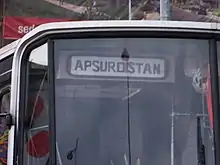Absurdistan
Absurdistan is a term sometimes used to satirically describe a country in which absurdity is the norm, especially in its public authorities and government. The expression was originally used by Eastern bloc dissidents to refer to parts (or all) of the Soviet Union and its satellite states.
Origins
The first known printed use of the word "Absurdistan" appeared in 1971 in the German monthly Politische Studien[1] "... erkennen wir, dass wir uns hier in Absurdistan bewegen."[2] Later, in Czech, the term Absurdistán was used by dissident and later president Václav Havel. This seems to indicate that use of the term began during perestroika. The first recorded printed use of the term in English was in Spectator in an article on August 26, 1989, about Czechoslovakia (Czechoslovakians have taken to calling their country "Absurdistan" because everyday life there has long resembled the "Theatre of the Absurd".) On September 18, 1989, an article in The Nation was called Prague Summer of '89: Journey to Absurdistan. On August 30, 1990, The New York Times used it in an article about the Soviet Union.,[3] and a January 18, 1990, Village Voice interview with Havel by Bonnie Sue Stein and Vit Horejs was headlined "The New King of Absurdistan".
Other uses

After its original reference to countries like Turkmenistan, Afghanistan and others ending in -stan in ironical use for the collapsing Eastern bloc, the term was extended to other countries. The term has been used in several titles of movies, books, and articles:
- The German comic book Abenteuer in Absurdistan mit Micky Maus (Germany 1993, volume 189 of the comic series "Walt Disneys Lustiges Taschenbuch").
- Welcome to Absurdistan: Ukraine, the Soviet Disunion and the West by Lubomyr Luciuc, 1994 (ISBN 096941255X).[4]
- The song "Absurdistan" by Blind Passengers (both single and video, 1995).
- "Absurdistan" is a song by German darkwave/gothic rock band Goethes Erben, from their 1997 single Sitz der Gnade. The title is often capitalized as "AbsurdISTan" to indicate a wordplay on “Absurd ist an”, roughly translating to “The absurd is on”.
- Hazám, Abszurdisztán (Absurdistan, my Home) is a book by Lajos Grendel, Bratislava, 1998 (ISBN 807149206X).
- Geboren in Absurdistan, 1999 Austrian movie.
- The album Absurdistan by Romanian artist Ada Milea (2002)
- Absurdistan[5] is an account of the author's experiences as an Australian Broadcasting Corporation foreign correspondent, including a detailed account of the death of his cameraman and his injury as a result of a car bomb during the 2003 invasion of Iraq.
- Absurdistan, a 2006 satirical novel by Gary Shteyngart set in a fictional former Soviet republic.[6]
- Absurdistan, a 2008 film directed by Veit Helmer.
- Apsurdistan is the name of the 2013 music album of the Bosnian band Dubioza Kolektiv.
References
- Monatshefte der Hochschule für politische Wissenschaften, München, veröffentlicht vom Isar-Verlag. (1971)
- Political Studies: Monthly of the University for political Studies, Munich, published by Isar-Verlag (1971) (free translation): ... we recognize, that we are here venturing on Absurdistan territory.
- "Sununu Tutors the Kremlin's Staff" by Francis X. Clines
- Luciuk, Lubomyr Y. (1995). Welcome to Absurdistan: Ukraine, the Soviet disunion and the West. Kashtan Press. ISBN 978-1-896354-04-0.
- Campbell, Eric (1 June 2010). Absurdistan. HarperCollins Publishers. ISBN 978-0-7304-4588-3.
- Shteyngart, Gary (2007). Absurdistan. Random House. ISBN 978-0-8129-7167-5.